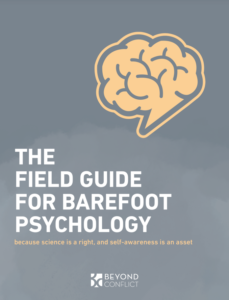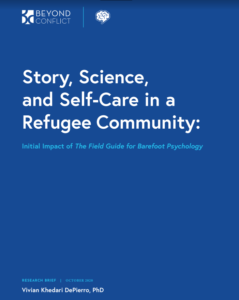Creating a New Narrative of Mental Health
There are approximately 82 million people displaced worldwide, including over 6 million Syrians, as a result of conflict and disaster. The experiences of conflict, trauma, and forced displacement put refugees and migrants at a higher risk of experiencing mental health challenges, while also facing the stigma associated with discussing mental health illness and seeking care. Despite the global recognition of a growing need for accessible and culturally sensitive mental health interventions worldwide, less than 1% of foreign health assistance is allocated to mental health. This has left many displaced populations with few resources to address the damaging emotional and psychological burdens associated with forced displacement, trauma, and violence.
Teaching Science Through Stories
The Field Guide for Barefoot Psychology is an educational and self-care tool written for forcibly displaced adults and those working with them. Grounded in the belief that science is a right and self-awareness is an asset, the Guide unpacks the biological and psychological processes associated with the experience of forced displacement, including issues such as fear, anxiety, stress, trauma, guilt, shame, and hopelessness. It also specifically explores positive assets for cultivating resilience, including the science of neuroplasticity, belonging, and post-traumatic growth.
Notably, the science covered in the Field Guide is introduced through storytelling. The pilot version of the Guide follows the narrative of two Syrian siblings living through conflict and migration and uses vignettes of their lives to delve into otherwise abstract scientific concepts. Overall, the Field Guide walks users through an educational and practical process that includes psychoeducation, self-assessment, and replicable self-care exercises to increase resilience and capacity to address mental health challenges at an individual and community level. This is the first time a large body of neuroscience, cognitive science, and clinical information about trauma and stress has been translated into Arabic. The Guide aims to normalize many of the psychological experiences associated with forced migration and conflict, framing issues such as anger, depression, and emotion dysregulation as natural, common responses of the brain and the body to abnormal life events. Beyond Conflict seeks to transform the Field Guide into a world-class tool with a proven impact on refugee and migrant mental health in communities affected by the Syrian refugee crisis, and other conflict and post-conflict contexts, including migrants and immigrant communities in the United States and beyond.
Measuring Impact
The Field Guide exists in both print and mobile application formats and was piloted in the Za’atri Refugee camp in Jordan. In the Spring of 2019, Beyond Conflict began a randomized control trial (RCT) to test the effectiveness of the Field Guide in reducing psychological and mental health stigma. The RCT, developed in partnership with the New School for Social Research, the University of California – Berkeley, and Questscope, is one of the largest neurophysiology studies ever conducted in a post-conflict setting. According to the RCT involving almost 160 participants in Za’atari, the Field Guide led to meaningful improvements in the psychological well-being of Syrian refugees. “We found that the Field Guide improved mental health stigma, PTSD symptoms, and emotion regulation, with effects holding 3-months after completion. These findings are encouraging because the Field Guide can be shared with large numbers of people in low-resource settings by non-specialists with minimal training,” explains Dr. Vivian Khedari DePierro, a clinical psychologist working with Beyond Conflict.
Launching a New Online Course
The Field Guide for Barefoot Psychology is now a free course offered by Edraak, a non-profit online course portal established by Queen Rania of Jordan for the promotion of knowledge in the Arab world. We have designed this course to suit anyone who has a passion and interest in science and the course topics, regardless of education level or cultural background. At the end of this course, we hope that learners will be able to better understand some of the mechanisms behind the brain and body’s stress response as well as the scientific underpinnings of various trauma-related symptoms and recovery from those symptoms. We hope that learners will be able to articulate the scientific foundations of chronic stress, trauma and resilience, and learn some specific tools for improving stress-related symptoms.


